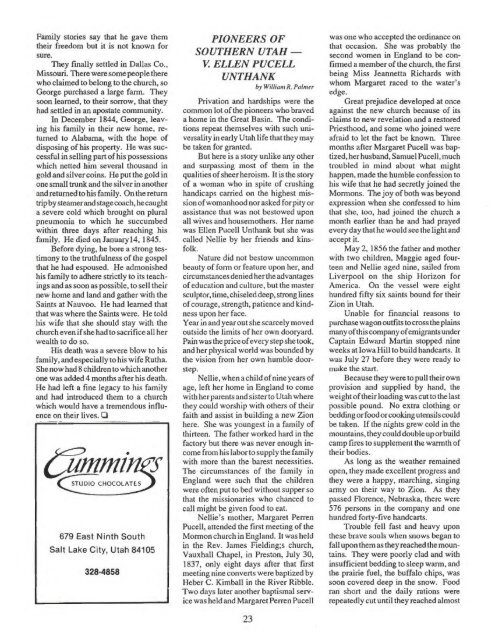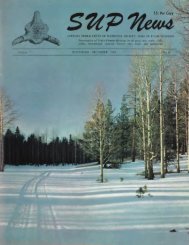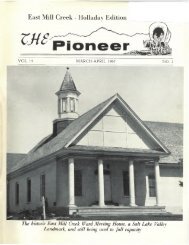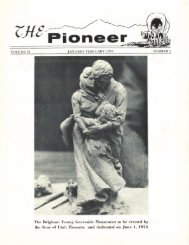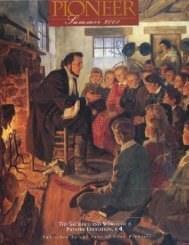Pioneer: 1990 Vol.37 No.6
Create successful ePaper yourself
Turn your PDF publications into a flip-book with our unique Google optimized e-Paper software.
Family stories say that he gave them<br />
their freedom but it is not known for<br />
sure.<br />
They Finally settled in Dallas Co.,<br />
Missouri. There were some people there<br />
who claimed to belong to the church, so<br />
George purchased a large farm. They<br />
soon learned, to their sorrow, that they<br />
had settled in an apostate community.<br />
In December 1844, George, leav¬<br />
ing his family in their new home, re¬<br />
turned to Alabama, with the hope of<br />
disposing of his property. He was suc¬<br />
cessful in selling part of his possessions<br />
which netted him several thousand in<br />
gold and silver coins. He put the gold in<br />
one small trunk and the silver in another<br />
and returned to his family. On the return<br />
trip by steamerand stage coach, he caught<br />
a severe cold which brought on plural<br />
pneumonia to which he succumbed<br />
within three days after reaching his<br />
family. He died on January 14, 1845.<br />
Before dying, he bore a strong tes¬<br />
timony to the truthfulness of the gospel<br />
that he had espoused. He admonished<br />
his family to adhere strictly to its teach¬<br />
ings and as soon as possible, to sell their<br />
new home and land and gather with the<br />
Saints at Nauvoo. He had learned that<br />
that was where the Saints were. He told<br />
his wife that she should stay with the<br />
church even if she had to sacrifice all her<br />
wealth to do so.<br />
His death was a severe blow to his<br />
family, and especially to his wife Rutha.<br />
She now had 8 children to which another<br />
one was added 4 months after his death.<br />
He had left a fine legacy to his family<br />
and had introduced them to a church<br />
which would have a tremendous influ¬<br />
ence on their lives. □<br />
679 East Ninth South<br />
Salt Lake City, Utah 84105<br />
328 4858<br />
PIONEERS OF<br />
SOUTHERN UTAH —<br />
K ELLEN PUCELL<br />
UNTHANK<br />
by William R. Palmer<br />
Privation and hardships were the<br />
common lot of the pioneers who braved<br />
a home in the Great Basin. The condi¬<br />
tions repeat themselves with such uni¬<br />
versality in early Utah life that they may<br />
be taken for granted.<br />
But here is a story unlike any other<br />
and surpassing most of them in the<br />
qualities of sheer heroism. It is the story<br />
of a woman who in spite of crushing<br />
handicaps carried on the highest mis¬<br />
sion of womanhood nor asked for pity or<br />
assistance that was not bestowed upon<br />
all wives and housemothers. Her name<br />
was Ellen Pucell Unthank but she was<br />
called Nellie by her friends and kins¬<br />
folk.<br />
Nature did not bestow uncommon<br />
beauty of form or feature upon her, and<br />
circumstances denied her the advantages<br />
of education and culture, but the master<br />
sculptor, time, chiseled deep, strong lines<br />
of courage, strength, patience and kind¬<br />
ness upon her face.<br />
Year in and year out she scarcely moved<br />
outside the limits of her own dooryard.<br />
Pain was the price of every step she took,<br />
and her physical world was bounded by<br />
the vision from her own humble door¬<br />
step.<br />
Nellie, when a child of nine years of<br />
age, left her home in England to come<br />
with her parents and sister to Utah where<br />
they could worship with others of their<br />
faith and assist in building a new Zion<br />
here. She was youngest in a family of<br />
thirteen. The father worked hard in the<br />
factory but there was never enough in¬<br />
come from his labor to supply the family<br />
with more than the barest necessities.<br />
The circumstances of the family in<br />
England were such that the children<br />
were often put to bed without supper so<br />
that the missionaries who chanced to<br />
call might be given food to eat.<br />
Nellie’s mother, Margaret Perren<br />
Pucell, attended the first meeting of the<br />
Mormon church in England. It was held<br />
in the Rev. James Fielding;s church,<br />
Vauxhall Chapel, in Preston, July 30,<br />
1837, only eight days after that first<br />
meeting nine converts were baptized by<br />
Heber C. Kimball in the River Ribble.<br />
Two days later another baptismal serv¬<br />
ice was held and Margaret Perren Pucell<br />
23<br />
was one who accepted the ordinance on<br />
that occasion. She was probably the<br />
second women in England to be con¬<br />
firmed a member of the church, the first<br />
being Miss Jeannetta Richards with<br />
whom Margaret raced to the water’s<br />
edge.<br />
Great prejudice developed at once<br />
against the new church because of its<br />
claims to new revelation and a restored<br />
Priesthood, and some who joined were<br />
afraid to let the fact be known. Three<br />
months after Margaret Pucell was bap¬<br />
tized, her husband, Samuel Pucell, much<br />
troubled in mind about what might<br />
happen, made the humble confession to<br />
bis wife that he had secretly joined the<br />
Mormons. The joy of both was beyond<br />
expression when she confessed to him<br />
that she, too, bad joined the church a<br />
month earlier than he and had prayed<br />
every day that he would see the light and<br />
accept it.<br />
May 2, 1856 the father and mother<br />
with two children, Maggie aged four¬<br />
teen and Nellie aged nine, sailed from<br />
Liverpool on the ship Horizon for<br />
America. On the vessel were eight<br />
hundred fifty six saints bound for their<br />
Zion in Utah.<br />
Unable for financial reasons to<br />
purchase wagon outfits to cross the plains<br />
many of this company of emigrants under<br />
Captain Edward Martin stopped nine<br />
weeks at Iowa Hill to build handcarts. It<br />
was July 27 before they were ready to<br />
make the start.<br />
Because they were to pull their own<br />
provision and supplied by hand, the<br />
weight of their loading was cut to the last<br />
possible pound. No extra clothing or<br />
bedding orfood or cooking utensils could<br />
be taken. If the nights grew cold in the<br />
mountains, they could double up or build<br />
camp fires to supplement the warmth of<br />
their bodies.<br />
As long as the weather remained<br />
open, they made excellent progress and<br />
they were a happy, marching, singing<br />
army on their way to Zion. As they<br />
passed Florence, Nebraska, there were<br />
576 persons in the company and one<br />
hundred forty-five handcarts.<br />
Trouble fell fast and heavy upon<br />
these brave souls when snows began to<br />
fall upon them as they reached the moun¬<br />
tains. They were poorly clad and with<br />
insufficient bedding to sleep warm, and<br />
the prairie fuel, the buffalo chips, was<br />
soon covered deep in the snow. Food<br />
ran short and the daily rations were<br />
repeatedly cut until they reached almost


